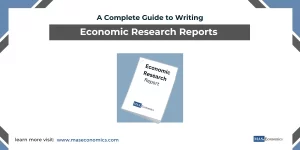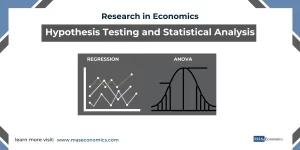Variables are the building blocks of any economic study. Whether you’re studying consumer behavior, market trends, or the impact of government policy, variables help researchers understand relationships between different economic factors. In the context of economic research, variables represent the key elements that can influence or be influenced by economic phenomena.
Accurately identifying and defining variables is crucial because they form the basis of economic models that explain how economies function. By understanding the types of variables used in economic research—independent, dependent, moderating, and intervening—researchers can design more precise studies and derive meaningful insights that inform policy and business decisions.
Types of Variables in Economic Research
In economic research, variables are classified based on their role in the relationship being studied. The four main types of variables are independent variables, dependent variables, moderating variables, and intervening variables. Understanding these distinctions is essential for building accurate economic models and interpreting research results.
1. Independent Variables
An independent variable is a factor that researchers manipulate or observe to determine its effect on another variable. It is the variable that drives change in the dependent variable. In economics, independent variables often represent policy tools, market conditions, or external factors that influence economic outcomes.
Example: Interest Rates as an Independent Variable
Consider a study examining how changes in interest rates affect investment levels. In this case, the interest rate is the independent variable because it is the factor that the researcher is investigating as a potential driver of changes in investment. The researcher might analyze how different interest rate levels influence business investment in new projects or consumer spending on large purchases, like homes or cars.
By altering the interest rate (either in a model or in real-world observations), the researcher can observe the effect this has on investment behavior, providing insights into the relationship between monetary policy and economic growth.
2. Dependent Variables
A dependent variable is the outcome or effect that researchers measure to assess whether changes in the independent variable have an impact. In economics, dependent variables often represent economic outcomes such as GDP growth, unemployment rates, or inflation levels.
Example: Investment Levels as a Dependent Variable
Continuing with the interest rate example, the level of investment would be the dependent variable. Researchers examine whether changes in the independent variable (interest rates) lead to observable changes in investment levels. If interest rates are lowered and investment increases, the researcher can conclude that interest rates have a causal effect on investment decisions.
Dependent variables provide key insights in any economic study because they represent the outcome that the researcher is trying to explain or predict. Accurately measuring dependent variables is crucial for drawing reliable conclusions from the research.
3. Moderating Variables
A moderating variable is a factor that affects the strength or direction of the relationship between the independent and dependent variables. In other words, it modifies how the independent variable influences the dependent variable. Moderating variables are important in economics because they help explain why the same economic policy might have different outcomes in different contexts or populations.
Example: Economic Growth as a Moderating Variable
Let’s assume an economist is studying the relationship between consumer confidence (independent variable) and consumer spending (dependent variable). A moderating variable in this scenario could be economic growth. When economic growth is strong, high consumer confidence might lead to a substantial increase in spending. However, during periods of slow or negative economic growth, the same level of consumer confidence might result in more cautious spending.
Understanding moderating variables helps economists fine-tune their models by accounting for contextual factors that could influence the relationship between the main variables being studied.
4. Intervening (Mediating) Variables
An intervening variable, also known as a mediating variable, explains the process or mechanism through which the independent variable affects the dependent variable. These variables help clarify how or why a particular effect occurs, adding depth to the analysis of economic relationships.
Example: Inflation as an Intervening Variable
Imagine a study exploring the relationship between money supply (independent variable) and purchasing power (dependent variable). An intervening variable in this case might be inflation. When the money supply increases, inflation may rise, which in turn reduces purchasing power. Here, inflation acts as a mediator that explains why an increase in the money supply leads to lower purchasing power.
By identifying intervening variables, economists can gain a better understanding of the causal pathways in their research. This leads to more accurate and nuanced interpretations of how variables interact.
Why Understanding Variables is Critical to Accurate Economic Modeling
Variables are not just isolated factors; they are interconnected components that shape economic outcomes. Understanding how different types of variables interact is essential for building robust economic models that reflect the complexities of real-world economies.
Clarifying Relationships
Economic relationships are rarely straightforward. By identifying independent, dependent, moderating, and intervening variables, researchers can clarify how different factors influence one another. For example, understanding that inflation mediates the relationship between money supply and purchasing power helps economists predict how changes in monetary policy will affect the economy in the long term.
Improving Model Precision
Accurately identifying the relevant variables allows economists to build models that capture the true dynamics of an economy. Incomplete or incorrect identification of variables can lead to faulty conclusions and poor policy recommendations. For instance, failing to account for moderating variables like economic growth could lead to inaccurate predictions about consumer behavior or business investment.
Enhancing Policy Design
In economic policy, understanding variables is critical for designing effective interventions. Policymakers rely on economic research to make informed decisions about interest rates, taxation, and spending. By analyzing how independent variables (like interest rates) affect dependent variables (such as investment levels) in the presence of moderating variables (such as economic growth), policymakers can craft more targeted and effective policies.
Accounting for Contextual Factors
Economic outcomes are influenced by a wide range of factors, many of which act as moderating or intervening variables. Recognizing these variables allows researchers and policymakers to account for the different contexts in which policies are implemented. This helps avoid oversimplified conclusions and ensures that policies are tailored to specific economic conditions.
Conclusion
In economic research, variables are the fundamental components that allow researchers to understand relationships, test hypotheses, and predict outcomes. Independent variables drive change, dependent variables reflect the outcomes, and moderating and intervening variables provide context and explain how or why changes occur.
Mastering the identification and use of these variables is essential for building accurate economic models and deriving meaningful insights from research. Whether it’s understanding how interest rates affect investment or how inflation mediates the relationship between money supply and purchasing power, a solid grasp of variables is critical to producing high-quality economic research.
As we move forward in this series, we will continue to explore the intricacies of economic research, including how to test hypotheses and analyze relationships between variables to draw robust conclusions.
FAQs:
What are variables in economic research?
Variables in economic research represent the key elements or factors that influence or are influenced by economic phenomena. They are essential for understanding relationships between different economic factors and building accurate models that explain how economies function.
What are the main types of variables used in economic research?
The main types of variables in economic research are independent variables, dependent variables, moderating variables, and intervening (mediating) variables. Each type plays a specific role in understanding relationships between economic factors.
What is an independent variable in economics?
An independent variable is a factor that researchers manipulate or observe to determine its effect on another variable. It is the cause or driver of change in the dependent variable. In economics, independent variables often represent policy tools or market conditions.
What is a dependent variable in economic research?
A dependent variable is the outcome that researchers measure to assess whether changes in the independent variable have an impact. It represents the effect in the cause-and-effect relationship. For example, GDP growth or investment levels are often used as dependent variables.
What is a moderating variable in economic research?
A moderating variable is a factor that affects the strength or direction of the relationship between the independent and dependent variables. It explains why the same economic policy may have different effects in different contexts or populations.
What is an intervening (mediating) variable in economic research?
An intervening variable, or mediating variable, explains the process or mechanism through which the independent variable affects the dependent variable. It provides deeper insights into how or why a particular effect occurs in the economic relationship being studied.
Why are variables important in economic research?
Variables are important in economic research because they help researchers understand relationships between different economic factors, test hypotheses, and build accurate models. Identifying the correct variables ensures that conclusions drawn from the research are reliable and meaningful.
How do independent and dependent variables interact in economic studies?
In economic studies, independent variables drive change, while dependent variables reflect the outcomes of that change. For instance, a study may examine how an independent variable like interest rates affects a dependent variable such as investment levels.
How do moderating variables influence economic outcomes?
Moderating variables influence economic outcomes by altering the strength or direction of the relationship between independent and dependent variables. For example, economic growth could moderate the relationship between consumer confidence and consumer spending.
How do intervening variables provide context in economic research?
Intervening variables provide context by explaining how or why an independent variable affects a dependent variable. They add depth to the analysis by revealing the mechanisms behind economic relationships, such as how inflation mediates the relationship between money supply and purchasing power.
Thanks for reading! Share this with friends and spread the knowledge if you found it helpful.
Happy learning with MASEconomics




